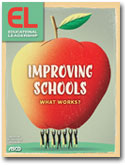Every year, after surveying many educators, the EL team selects the themes for the following publishing cycle. This month's theme reflects educators' first choice of themes last year—"Improving Schools: What Works?" That you chose this theme should help dispel just one of the myths that have grown up about school reform: that educators are stuck in the status quo and don't care to implement change. Here are some other myths about school improvement that our writers contradict:
Myth #1. We don't really know what works. We do know what works in education, our authors tell us, citing both research and their experience in turning around schools. Reform does happen, and it happens in many different ways. Karin Chenoweth, for example, enumerates practices—from focusing on what kids need to learn, to collaborating, to using data—and describes how schools she studied employed those practices. Martha Bruckner and Ann Mausbach describe how their community-wide effort lifted graduation rates, and Christine Campbell (online) tells how a portfolio of schools banding together to improve one another is working effectively.
Myth #2. A single reform will move the needle. From Time's cover excoriation of rotten apple teachers, one would think that getting rid of the bottom 3 percent of educators (as judged by their students' test scores) will do wonders for all schools. The fact that the second lowest group of teachers would then become the "rotten apples" seems to have escaped the minds of the billionaire funders.
Indeed, even those who advocate disparate visions about "what works" most likely would concur that there is no panacea that will help all schools all the time. David Berliner and Gene Glass tell why contexts matter in the social sciences. They describe the problems with replicability, transfer, and fading effects of single reforms, but they do not conclude that the reform process is a waste of time. Far from it: "A realistic view of the difficulties must not lead to despair," they write. "Trying out programs that have been successful elsewhere, designing new programs that fit local circumstances, and attempting to implement good ideas are characteristic of exemplary leadership." Although sometimes reforms don't work as expected, sometimes they do!
Myth #3. One improvement is as good as another. John Hattie, whose research synthesis relates the effect size of many different practices, focuses here on just one practice that his research points to: High-impact leadership. Emphasizing his mantra, "Know thy impact," he writes, "Almost everything in education works—but is it working above the average of all possible influences?"
Myth #4. Researchers agree about what's needed most. OK, so this isn't a myth that many people actually believe. You will find contradictory views in this issue as in every other. Andy Hargreaves and Alan Boyle, for example, describe leadership that results in remarkable success—what they call uplifting leadership. Although this kind of leadership is different from the one that Hattie describes, the apparent contradiction can be resolved. See Bryan Goodwin's description of the argument between two teams of McREL researchers trying to determine which type of leadership—directive or empowering—works best. Directive leadership may get faster results, the teams concluded, whereas empowering leadership may have long-lasting effects.
Myth #5. Educators resist accountability. In a recent Washington Post editorial about the new report card proposed for teacher education programs, writers intone: "That there was immediate pushback to Mr. Duncan's announcement from the teachers unions and institutions of learning came as no surprise, given their record of resisting any and all accountability measures."
Just because educators do not agree with reforms coming down from on high, or even with one another, this does not mean they resist all accountability measures. For ways educators embrace accountability, see Amanda Datnow and Vicki Park's humanistic way of looking at data; Marc Tucker's commentary on the need for continuous improvement; and Martin Brooks's (online) description of peer evaluation for schools. And, for evidence that collaborative, not confrontational, efforts work in our schools, take your pick of many articles (pp. 22, 30, 56). Evidence abounds that educators are hard at work improving schools. More support from policy-makers for internal efforts would go a long way toward making them more successful.
Figure

<P ID="scherer-audio"><!--[** NOTE ** need to get the correct code for perspectives ;; need to call carmen]http://bcove.me/ievdmjkthttp://video.ascd.org/services/player/bcpid3748202131001?bckey=AQ~~,AAAAAmGjiRE~,escbD3Me8-xL6M8oiF7Rt7Fi-UtSZysJ&bctid=3979775494001--><!-- Start of Brightcove Player --><!--div style="display:none"></div--><!--By use of this code snippet, I agree to the Brightcove Publisher T and C found at https://accounts.brightcove.com/en/terms-and-conditions/. --> <!--<object id="myExperiencexxx" class="BrightcoveExperience"> <param name="bgcolor" value="#FFFFFF" /><param name="width" value="570" /><param name="height" value="380" /><param name="playerID" value="18377529001" /> <param name="playerKey" value="AQ~~,AAAAAmGjiRE~,escbD3Me8-wT_coVb7sTe18vG6vv3Oyk" /> <param name="isVid" value="true" /><param name="dynamicStreaming" value="true" /><param name="@videoPlayer" value="xxx" /> </object>--><!-- This script tag will cause the Brightcove Players defined above it to be created as soonas the line is read by the browser. If you wish to have the player instantiated only afterthe rest of the HTML is processed and the page load is complete, remove the line.--><!-- End of Brightcove Player --><!-- use this code for HTML --><!--add video html-->


